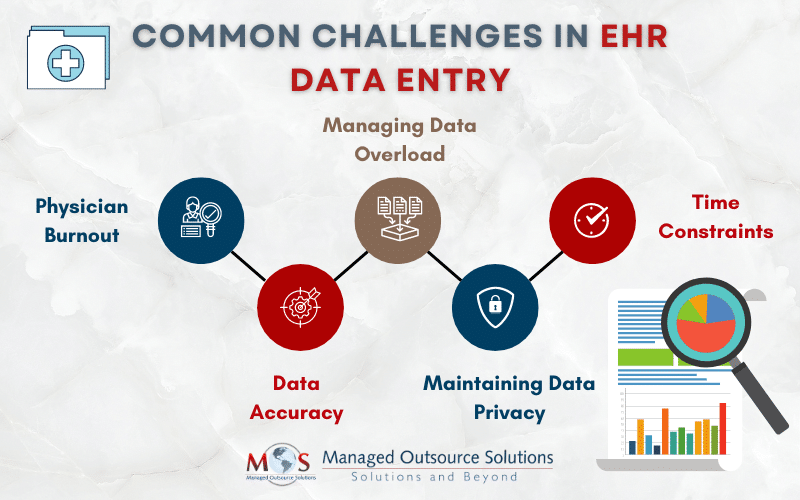Electronic health records (EHRs) are essential for managing patient information more efficiently and providing high quality care. Efficient entry of data into EHR systems is crucial. As they focus on providing quality care, healthcare providers can rely on data entry services to ensure quality EHR documentation.
Importance of Accurate EHR Data Entry
EHR data entry is crucial in a healthcare setting for many reasons, but primarily because it is the foundation for efficient healthcare delivery. Healthcare providers need to make well-informed medical decisions. Timely and accurate data entry into EHR systems guarantees that they have quick access to comprehensive patient information. Accurate medical data entry facilitates better coordination and continuity of care by enabling a smooth information flow between various departments and healthcare providers. Proper record-keeping reduces the possibility of medical errors, increases the accuracy of diagnosis, and improves treatment plans. Up-to-date information in the EHR also facilitates crucial tasks like invoicing, reporting, and regulatory compliance, fostering efficiency and reducing legal risks.
Common Challenges of EHR Data Entry
- Physician Burnout: Physician fatigue associated with EHR data entry is a serious problem. When they spend a lot of time entering data into EHR systems, physicians frequently experience higher levels of stress and lower work satisfaction. EHR interface complexity and the requirement for extensive documentation can lead to frustration. Enhancing EHR usability, streamlining documentation procedures, and providing organizational support are necessary to mitigate physician burnout associated with EHR data entry. This will lessen the workload for healthcare professionals and improve the general well-being of the healthcare workforce.
- Data Accuracy: One of the most important issues with EHR data entry is ensuring data accuracy. Patient safety may be compromised by inaccurate data, which may result in misdiagnoses and inappropriate therapies. Typographical errors and inaccurate patient information are examples of human error that can occur during manual data entry. It can take a lot of time and effort to maintain high levels of data accuracy. Doing so calls for rigorous validation procedures and close attention to detail.
- Big Data Volumes and Data Overload Management: Every day, healthcare facilities produce enormous amounts of data, including medical records, test findings, patient histories, and more. It is difficult to efficiently manage this vast amount of data. Overwhelming amounts of data can impede the speed at which information is entered, increase risk of mistakes, and make it challenging to quickly obtain crucial data. Complex systems and procedures are needed to handle this data overflow properly.
- Maintaining Data Privacy: Data privacy is a significant concern in EHR data entry due to the sensitive nature of patient information. Ensuring the confidentiality and security of medical data is paramount to protect patients’ privacy and maintain trust in the healthcare system. Challenges include the potential for unauthorized access, data breaches, and improper handling of information during data entry processes. Strict access controls, encryption protocols, and regular audits are essential measures to mitigate data privacy risks. Healthcare providers must adhere to regulatory standards like HIPAA to safeguard patient data and uphold ethical standards in EHR data entry practices.
- Time Constraints: In the healthcare sector, every second matters. Timely access to accurate information is crucial to deliver quality care. Healthcare professionals must manage a heavy workload by juggling several activities at once, even as they manage medical data input. They have strict deadlines to meet and must precisely input patient information, update records, and guarantee data integrity. Data accuracy might also be impacted by time constraints. Inaccuracies and inconsistencies in patient records may result from rushing through the procedure to meet deadlines. Outsourcing data entry is a viable strategy to manage this challenging process.
Get in touch with us to learn how our expertise can alleviate your data entry challenges.
Clinicians must just have the best tools in the business for efficient data entry. By leveraging professional data entry services, healthcare providers can optimize their EHR documentation, leading to improved patient care and operational efficiency.





